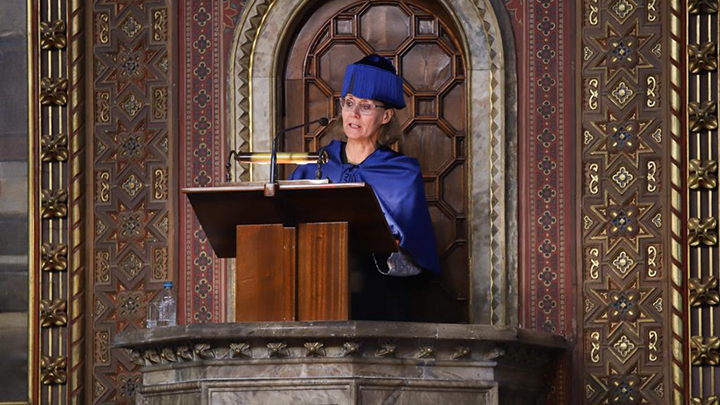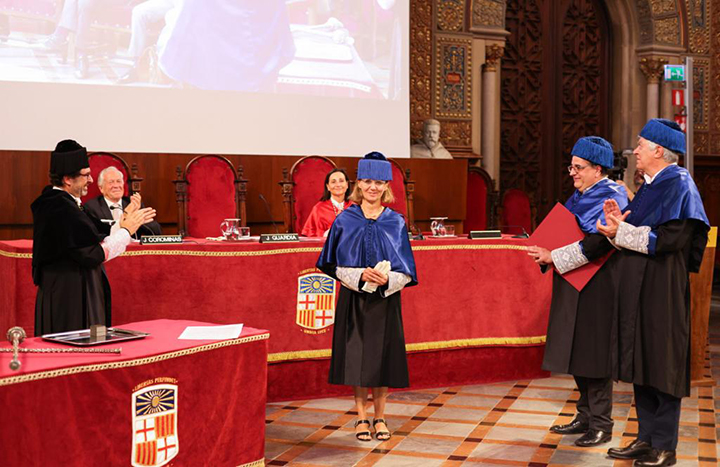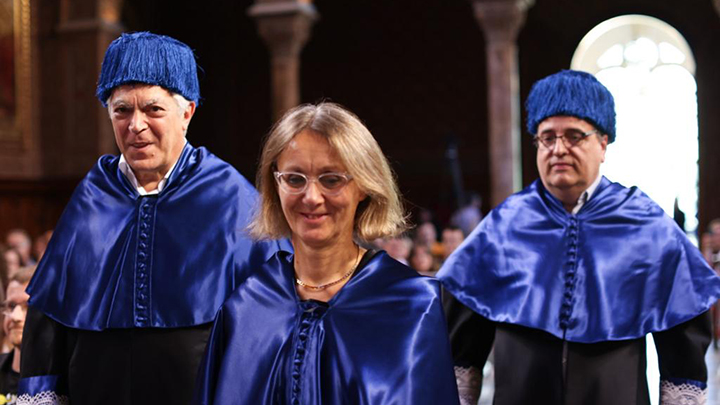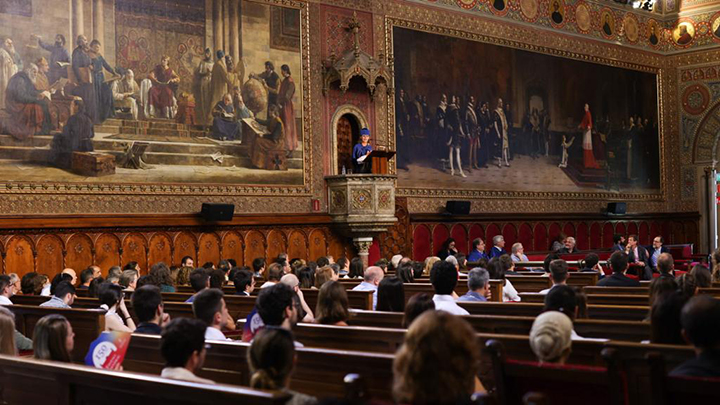Honorary doctorate awardee Roberta Sessoli highlights the impact of the radical changes on the second quantum revolution on society

News
|
Institutional
(06/06/2023)
Today, the University of Barcelona awarded Roberta Sessoli, professor at the University of Florence, an honorary doctorate, in an event that took place in the Paranimph of the UB and was chaired by the rector, Joan Guàrdia. The sponsor was Albert Escuer, professor at the Department of Inorganic and Organic Chemistry of the Faculty of Chemistry and member of the Institute of Nanosciences and Nanotechnologies (IN2UB) of the UB.

News
|
Institutional
06/06/2023
Today, the University of Barcelona awarded Roberta Sessoli, professor at the University of Florence, an honorary doctorate, in an event that took place in the Paranimph of the UB and was chaired by the rector, Joan Guàrdia. The sponsor was Albert Escuer, professor at the Department of Inorganic and Organic Chemistry of the Faculty of Chemistry and member of the Institute of Nanosciences and Nanotechnologies (IN2UB) of the UB.
The seed of a new research field
In her speech, the new honorary doctorate awardee said she was “deeply honoured” to receive this award by the University of Barcelona, and she stressed that it is an “especially emotional” appointment because she shared the first and most creative phase of her career with UB researchers. “The universities of Barcelona and Florence have hosted pioneers in molecular magnetism, and their close collaboration has been the seed of a new research field that has expanded beyond the borders of disciplines”, she said.
A revolution in the field of magnetism
Then, Roberta Sessoli used the word spin, “a fundamental ingredient of the Universe, which is the origin of magnetism, a property that fascinates the human mind”, to sum up her career in a single word. The fact is that magnetism belongs to the field of physics, and Sessoli wanted to recall and highlight the privilege of having been able to contribute, as a chemist “to the discovery that a single molecule, if properly designed, can exhibit the memory effect that makes magnets so crucial in all technologies”.
“This finding has revolutionized the field of magnetism. […] Beyond introducing a novel class of magnetic memories, it has allowed the detection of quantum effects in a classical property such as magnetic hysteresis [phenomenon that enables magnets to store information, thus filling the gap between the quantum and macroscopic worlds”, she said. “Interestingly, this study has been carried out in parallel with the University of Barcelona, especially by Professor Javier Tejada Palacios and his group”.
According to the researcher, the most immediate potential application of this finding —albeit not yet applied— is “to use molecules as ultra-miniaturized memory elements”.
Magnetic molecules and quantum information technology
In her speech, Sessoli highlighted the disruptive changes of the so-called second quantum revolution and exemplified them with quantum computing, quantum sensing and quantum encryption. Regarding the latter, she also predicted that “quantum computers will not replace the classical ones but rather flank them by solving otherwise untreatable problems”.
In this sense, the professor pointed out that, according to the European Commission's Strategic Research Agenda, "magnetic molecules are definitely in the race for quantum information". She also pointed out that, over the last years, interest in the spin of these molecules has increased due to the important advances that have been made in the fields of nanoscience and nanotechnology, which make it possible, for example, "to control the spin of a single atom on a surface, using scanning microscopy combined with microwave excitation".
Regarding this area, Sessoli explained that her line of research is currently seeking to overcome the drawbacks of applying molecular spin. One such drawback, for example, is that the centrifugation operation requires very low temperatures. But, at the same time, she pointed out that a possible solution would consist of taking advantage of another notable aspect of molecules, chirality, "a property that refers to the possibility of having structures that are not superimposable to their mirror image”.
Moreover, the professor also reported that the European Research Council has recently funded a collaborative Synergy project to explore the potential of chiral molecules in quantum information science.
A concern for young researchers
Finally, Roberta Sessoli acknowledged the “great privilege” of having been able to transform her passion for science into a profession, and regretted that, currently, the opportunities for early-stage researchers are “not at the level” of the previous programmes of her generation. “I am concerned that the international research environment I have grown in will fade if not appropriately supported and stimulated”, she said.
Research with more than 50,000 citations
The sponsor of the ceremony, Albert Escuer, professor of the Department of Inorganic and Organic Chemistry, described the career of the new honorary doctor as "the farthest from routine, always at the forefront of research into new phenomena and without neglecting the impact on possible applications".
Escuer has highlighted the "extraordinary" impact of Sessoli's work —author of several books and more than 400 articles published in leading scientific journals that accumulate more than 50,000 citations— and her participation in several advisory committees. In this regard, she has highlighted the presence of the professor in the Science and Technology Advisory Council of the European Commission in 2013 and 2014, under the presidency of José Manuel Durão Barroso, "in which she contributed to the planning of the Horizon 2020 programme".
This impact of Sessoli's research has resulted "in numerous awards from a wide range of entities and organizations", both in the field of chemistry —she has received the highest distinctions from the main European chemical societies— and in physics, with prizes such as the Agilent Technologies Europhysics Prize or the Beller Lectureship of the American Physical Society.
Finally, the sponsor emphasized the "training capacity" of the laboratory directed by Professor Sessoli, where "numerous researchers from all over the world have been trained", and pointed out that "of the eight editions of the prestigious OKIA prizes awarded by the European Institute of Molecular Magnetism since 2006, three have been won by researchers from her laboratory".
The Bachelor’s degree extraordinary awards for the 2020-2021 academic year were then presented.
The president of the Board of Trustees, Joan Corominas, highlighted Sessoli's relevant contribution to "the world of chemistry and the applications of her work in quantum computation" and also made a special mention to the awardees of the extraordinary degree award. He praised their "capacity for work and the effort and example they set for their generation".
The rector, Joan Guàrdia, closed the ceremony with an apology for merit. He claimed it as a fundamental motive of university life and significance: "Merit requires perseverance, effort, tenacity, collaboration and work, and its exercise shows that work serves to influence and change the world".
In her speech, the new honorary doctorate awardee said she was “deeply honoured” to receive this award by the University of Barcelona, and she stressed that it is an “especially emotional” appointment because she shared the first and most creative phase of her career with UB researchers. “The universities of Barcelona and Florence have hosted pioneers in molecular magnetism, and their close collaboration has been the seed of a new research field that has expanded beyond the borders of disciplines”, she said.
A revolution in the field of magnetism
Then, Roberta Sessoli used the word spin, “a fundamental ingredient of the Universe, which is the origin of magnetism, a property that fascinates the human mind”, to sum up her career in a single word. The fact is that magnetism belongs to the field of physics, and Sessoli wanted to recall and highlight the privilege of having been able to contribute, as a chemist “to the discovery that a single molecule, if properly designed, can exhibit the memory effect that makes magnets so crucial in all technologies”.
“This finding has revolutionized the field of magnetism. […] Beyond introducing a novel class of magnetic memories, it has allowed the detection of quantum effects in a classical property such as magnetic hysteresis [phenomenon that enables magnets to store information, thus filling the gap between the quantum and macroscopic worlds”, she said. “Interestingly, this study has been carried out in parallel with the University of Barcelona, especially by Professor Javier Tejada Palacios and his group”.
According to the researcher, the most immediate potential application of this finding —albeit not yet applied— is “to use molecules as ultra-miniaturized memory elements”.
Magnetic molecules and quantum information technology
In her speech, Sessoli highlighted the disruptive changes of the so-called second quantum revolution and exemplified them with quantum computing, quantum sensing and quantum encryption. Regarding the latter, she also predicted that “quantum computers will not replace the classical ones but rather flank them by solving otherwise untreatable problems”.
In this sense, the professor pointed out that, according to the European Commission's Strategic Research Agenda, "magnetic molecules are definitely in the race for quantum information". She also pointed out that, over the last years, interest in the spin of these molecules has increased due to the important advances that have been made in the fields of nanoscience and nanotechnology, which make it possible, for example, "to control the spin of a single atom on a surface, using scanning microscopy combined with microwave excitation".
Regarding this area, Sessoli explained that her line of research is currently seeking to overcome the drawbacks of applying molecular spin. One such drawback, for example, is that the centrifugation operation requires very low temperatures. But, at the same time, she pointed out that a possible solution would consist of taking advantage of another notable aspect of molecules, chirality, "a property that refers to the possibility of having structures that are not superimposable to their mirror image”.
Moreover, the professor also reported that the European Research Council has recently funded a collaborative Synergy project to explore the potential of chiral molecules in quantum information science.
A concern for young researchers
Finally, Roberta Sessoli acknowledged the “great privilege” of having been able to transform her passion for science into a profession, and regretted that, currently, the opportunities for early-stage researchers are “not at the level” of the previous programmes of her generation. “I am concerned that the international research environment I have grown in will fade if not appropriately supported and stimulated”, she said.
Research with more than 50,000 citations
The sponsor of the ceremony, Albert Escuer, professor of the Department of Inorganic and Organic Chemistry, described the career of the new honorary doctor as "the farthest from routine, always at the forefront of research into new phenomena and without neglecting the impact on possible applications".
Escuer has highlighted the "extraordinary" impact of Sessoli's work —author of several books and more than 400 articles published in leading scientific journals that accumulate more than 50,000 citations— and her participation in several advisory committees. In this regard, she has highlighted the presence of the professor in the Science and Technology Advisory Council of the European Commission in 2013 and 2014, under the presidency of José Manuel Durão Barroso, "in which she contributed to the planning of the Horizon 2020 programme".
This impact of Sessoli's research has resulted "in numerous awards from a wide range of entities and organizations", both in the field of chemistry —she has received the highest distinctions from the main European chemical societies— and in physics, with prizes such as the Agilent Technologies Europhysics Prize or the Beller Lectureship of the American Physical Society.
Finally, the sponsor emphasized the "training capacity" of the laboratory directed by Professor Sessoli, where "numerous researchers from all over the world have been trained", and pointed out that "of the eight editions of the prestigious OKIA prizes awarded by the European Institute of Molecular Magnetism since 2006, three have been won by researchers from her laboratory".
The Bachelor’s degree extraordinary awards for the 2020-2021 academic year were then presented.
The president of the Board of Trustees, Joan Corominas, highlighted Sessoli's relevant contribution to "the world of chemistry and the applications of her work in quantum computation" and also made a special mention to the awardees of the extraordinary degree award. He praised their "capacity for work and the effort and example they set for their generation".
The rector, Joan Guàrdia, closed the ceremony with an apology for merit. He claimed it as a fundamental motive of university life and significance: "Merit requires perseverance, effort, tenacity, collaboration and work, and its exercise shows that work serves to influence and change the world".
Multimedia gallery



